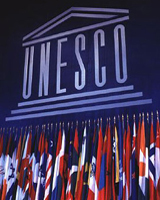
|
| © UNESCO |
The right to freedom of information (FOI) is a fundamental human right as stated in the UN General Assembly 1946, Resolution 59. UNESCO’s mandate as set out in its 1945 Constitution specifically is mandating the Organization to «promote the free flow of ideas by word and image». Access to information is an essential component of enabling this flow of ideas to happen, both through FOI laws and more generally through Freedom of Expression.
The importance of promoting good governance and the role which free independent and pluralistic media can play in its creation has been stressed through the Dakar Declaration on Media and Good Governance, endorsed by UNESCO General Conference. This Declaration also calls for UNESCO: “to promote the adoption of national access to information legislation and to develop international principles on access to information”.
However simply passing FOI laws does not guarantee that they will be implemented or contribute to accountability. Other mechanisms have to be put in place which make this happen.
One of the areas that UNESCO has been working on in recent years is E-governance, which offers among other the practical means of putting FOI into action and developing the means of encouraging citizen participation and promoting greater transparency. E-Governance is the public sector’s use of information and communication technologies with the aim of improving information and service access and delivery, encouraging equal citizen participation in the decision-making process and making government more accountable, transparent and effective.
UNESCO is also at the forefront of capacity building through ICT use in the developing world. ICT resources are crucial to FOI access and their absence can highlight the digital divide and the ensuing digital and knowledge gap. This inequality of digital access exists between developing and developed countries; but also within countries, where certain marginalized groups are excluded from access or lack the necessary skills to make use of ICTs. Initiatives such as the implantation of Community Media Centres (CMC) can make a difference in the everyday inclusion of marginalized groups and help promote active citizenship.
This activity is also part of UNESCO’s celebrations for the 60th anniversary of the Universal Declaration of Human Rights, and in the light of World Summit on Information Society (WSIS) follow-up.
The importance of promoting good governance and the role which free independent and pluralistic media can play in its creation has been stressed through the Dakar Declaration on Media and Good Governance, endorsed by UNESCO General Conference. This Declaration also calls for UNESCO: “to promote the adoption of national access to information legislation and to develop international principles on access to information”.
However simply passing FOI laws does not guarantee that they will be implemented or contribute to accountability. Other mechanisms have to be put in place which make this happen.
One of the areas that UNESCO has been working on in recent years is E-governance, which offers among other the practical means of putting FOI into action and developing the means of encouraging citizen participation and promoting greater transparency. E-Governance is the public sector’s use of information and communication technologies with the aim of improving information and service access and delivery, encouraging equal citizen participation in the decision-making process and making government more accountable, transparent and effective.
UNESCO is also at the forefront of capacity building through ICT use in the developing world. ICT resources are crucial to FOI access and their absence can highlight the digital divide and the ensuing digital and knowledge gap. This inequality of digital access exists between developing and developed countries; but also within countries, where certain marginalized groups are excluded from access or lack the necessary skills to make use of ICTs. Initiatives such as the implantation of Community Media Centres (CMC) can make a difference in the everyday inclusion of marginalized groups and help promote active citizenship.
This activity is also part of UNESCO’s celebrations for the 60th anniversary of the Universal Declaration of Human Rights, and in the light of World Summit on Information Society (WSIS) follow-up.




